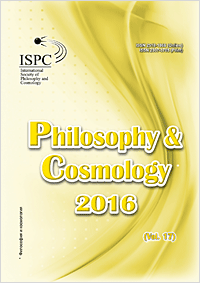Методологічний аналіз доктрини Платона о просторі і особистості в діалозі «Тімей»
The Methodological Analysis of the Plato’s Doctrine About Space and the Person in Dialogue “Timaeus”
Author(s): Viacheslav MeshkovSubject(s): Philosophy, History of Philosophy, Ancient Philosphy
Published by: Международное философско-космологическое общество
Keywords: deep thinking;intrinsic thinking;deterministic approach;cogitative construct;philosophical and scientific knowledge;
Summary/Abstract: The paper focus is on the main methodological sets of Plato which substantially influenced his philosophic and scientific thinking, expressed in the dialogue ‘Timaeus’, as well as defined the specifics of his doctrine in relation to the cosmos and human being: the principle of substantial perfection, deterministic approach, a tendency to analyze the empiric material with the means of mathematical objects. Plato’s understanding of the cosmos and the human body as lively, holistic constructions enabled their fruitful systematic studies. Shaping his teaching on the soul and the body of human being, Plato endeavoured to solve one of the most complicated tasks: to establish the first theoretical, mathematised system, and under such conditions to fill the pure language of observations with ideal constructs. The author shows that one of the most important scientific achievements of the Athenian philosopher was the use of the thinking constructions of geometrical triangles, which made possible creating of the theoretical models of living organisms, with explaining their nature and functioning that was one among the first in the history of science. Moreover, Plato was the first in the history of science who filled with the theoretical contents, not the first element only, but all the examined material objects.
Journal: Philosophy and Cosmology
- Issue Year: 17/2016
- Issue No: 17
- Page Range: 200-209
- Page Count: 10
- Language: Russian

